Pork Pot Stickers
This recipe for pork pot stickers delivers tender, succulent dumplings with deliciously crispy bottoms. This classic Asian dim sum appetizer is visually stunning, undeniably delicious, and perfect for breakfast, holidays or any special occasion.
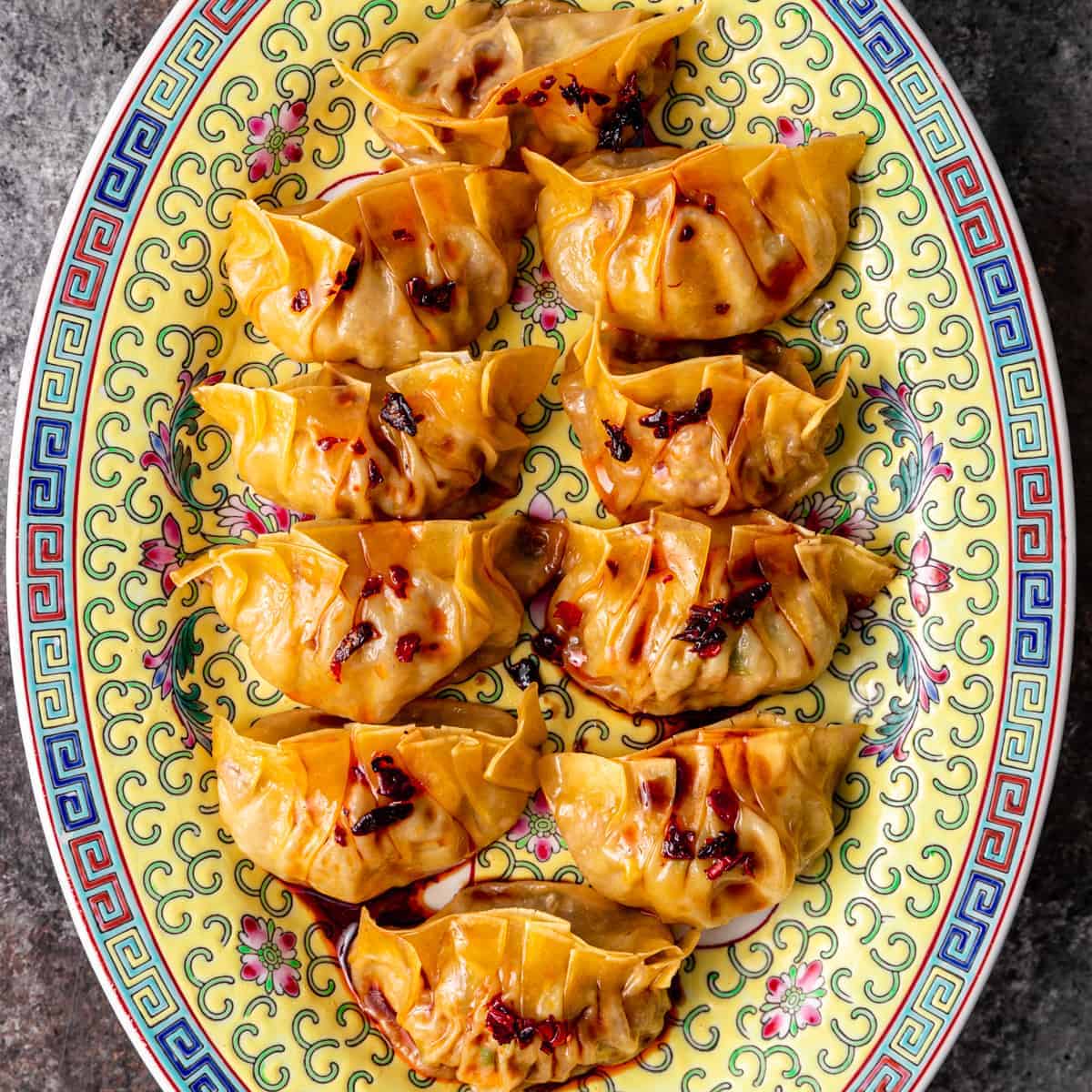
My first tasting of these pork pot sitckers was at the San Francisco restaurant Yet Wah, and I was hooked. Years later when I visited China I tried every type of dim sum I could find in Beijing, Xi’an, Chongqing and Shanghai. The most memorable seafood ones were when I visited a Hong Kong dim sum house, talk about fresh!
From egg rolls to pork shumai and char siu bao to wontons, there are delicious bites for casual get-togethers as well as formal cocktail parties. Later, living in San Diego, we would religiously go to Jasmine on Convoy for dim sum. I highly recommend if you are ever there…
Watch the Step-by-Step Video!
To see how I make these beauties and check out the how-to-make video in the recipe card below for all the details!
These pork pot stickers are a traditional Chinese appetizer with major staying power. Get ready for soft, chewy dumplings with a mouthwatering pork and veggie filling. The bottoms are fried to crispy perfection before being steamed to create this work of edible art.
I love to anoint them with my Ultimate Spicy Chili Crisp and devour!
While the exact origin is unknown, the earliest versions of potstickers reach all the way back to the Chinese Song Dynasty (960 – 1280 A.D.). The common myth is that, around this time, a chef in the Imperial court stepped away from the wok for too long. Upon returning, the dumplings were “stuck to the pot.” He was able to salvage the recipe with steam, and the crispy-bottom dumplings were a hit. What a tasty accident!

Table of Contents
For more Asian-inspired pork dishes, check out my recipes for Moo Shu Pork, Pork and Eggplant Stir Fry, and this Chinese BBQ Pork.
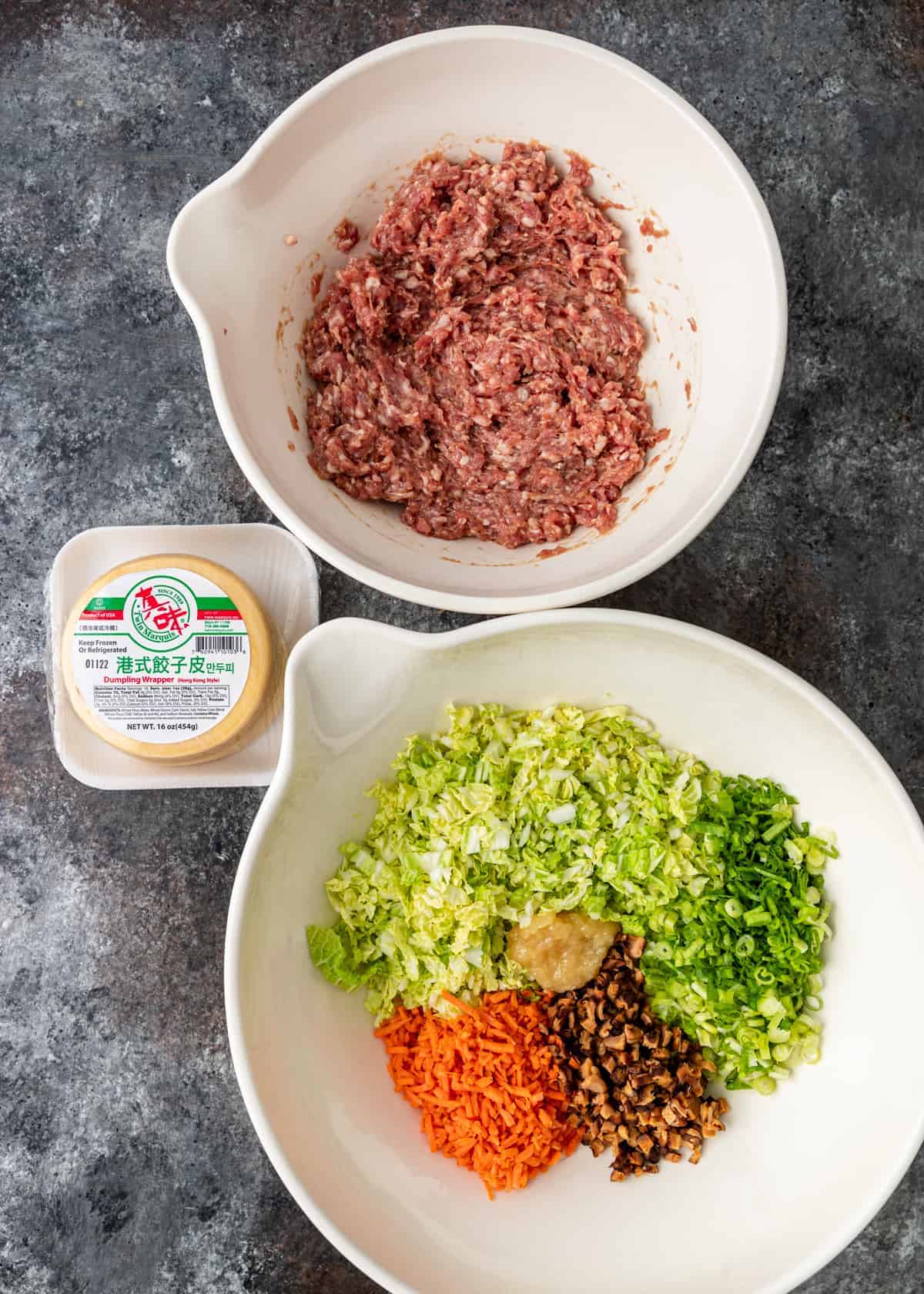
- Ground Pork – This can be on the lean side, so I add peanut oil to keep the pork nice and juicy.
- Filling – I chose classic Nappa cabbage, carrots, and dried shiitake mushrooms to go into the filling. Feel free to incorporate other veggies as desired. You can also use fresh mushrooms (shiitake, oyster, etc.) in place of the dried mushrooms.
- Dumplings Wrappers – Unless you have endless time on your hands, I highly recommend getting premade wrappers. Look for potsticker dough, fresh or frozen, from your local Asian market.
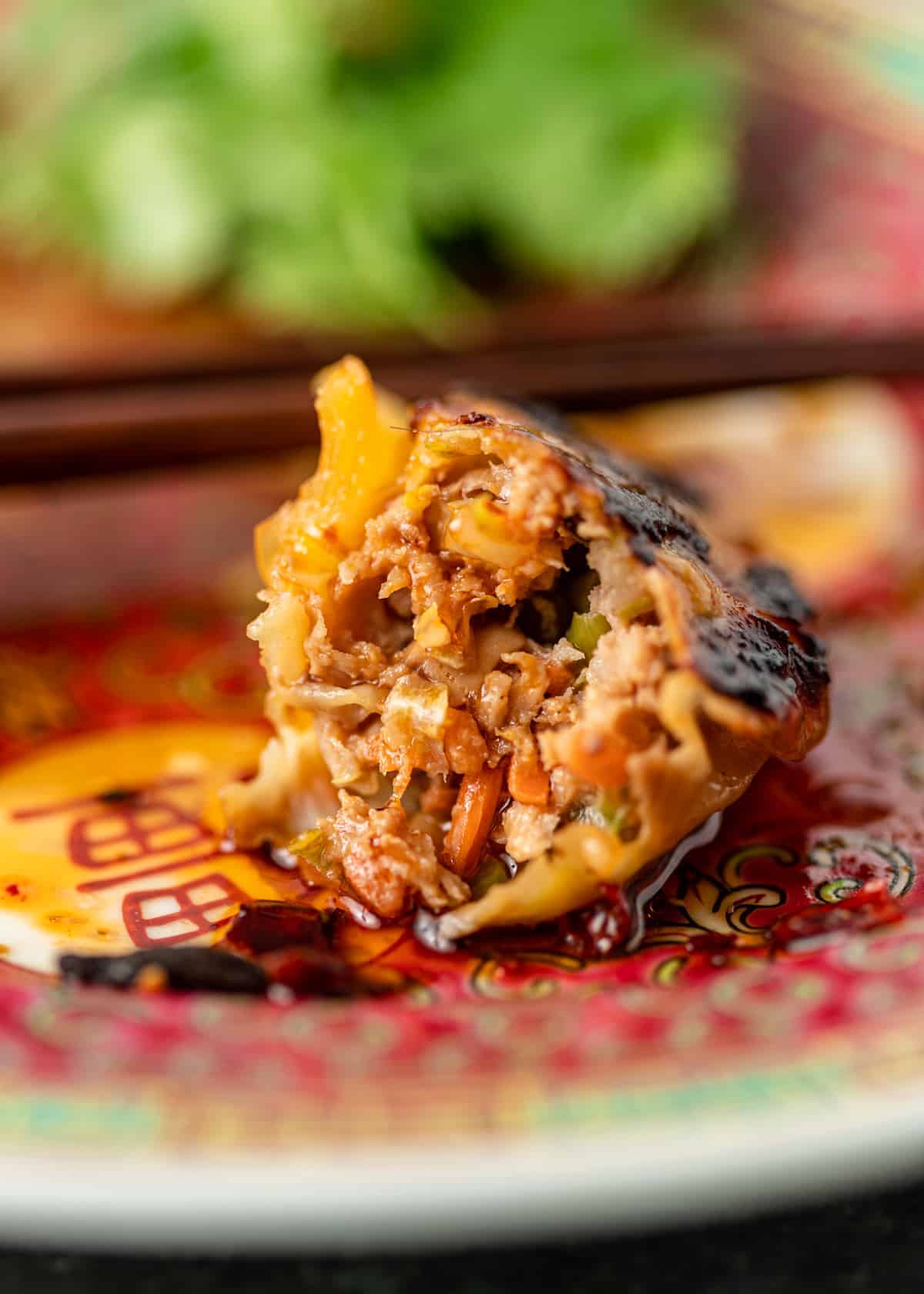
- Prepare the Mushrooms. Place the dried mushrooms in a small bowl with enough hot water to cover them. Place something on top to keep them submerged and let them soak until softened, about 20 minutes. Then, drain the mushrooms, rinse, and squeeze out any excess liquid. Remove and discard the stems. Cut the mushroom caps into thin diagonal strips, rotate 90 degrees, and chop into fine bits.
- Mix Pork & Oil. Add one tablespoon of peanut oil to the pork in a large bowl and mix thoroughly.
- Create the Filling. Thoroughly mix the rice wine, water, cornstarch, sesame oil, soy sauce, kosher salt, and white pepper into the pork mixture. Next, add the shredded cabbage and carrots, chopped green onions, mushrooms, and ginger, and mix to fully incorporate.
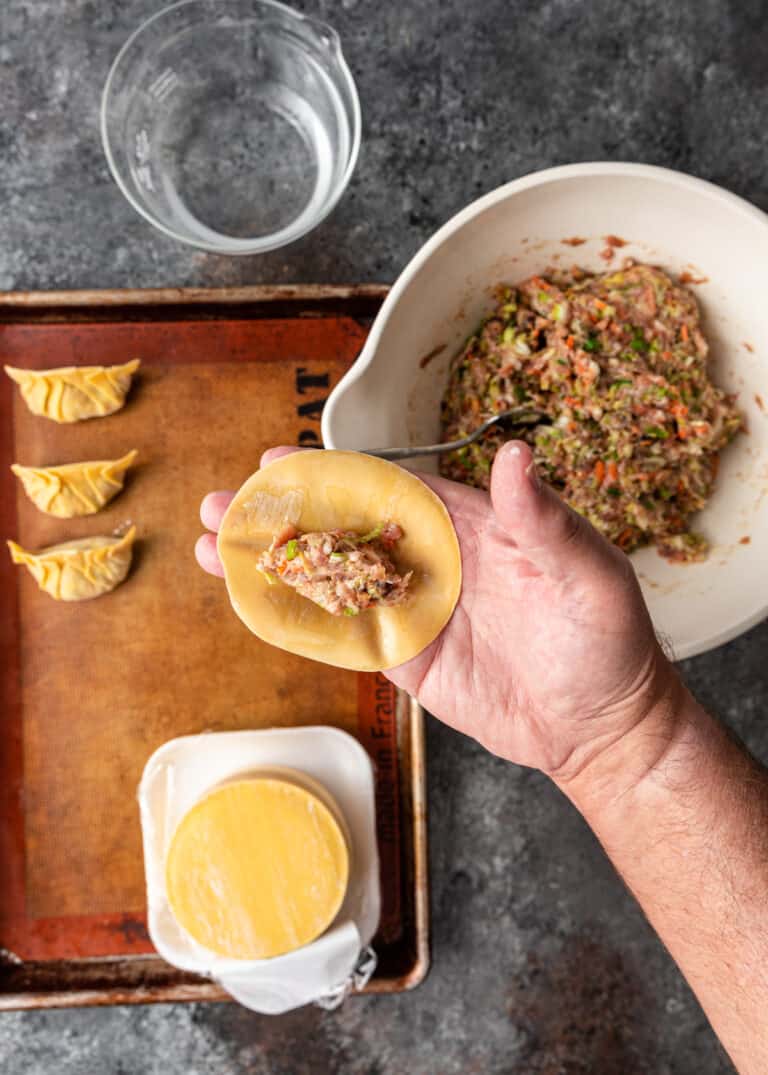
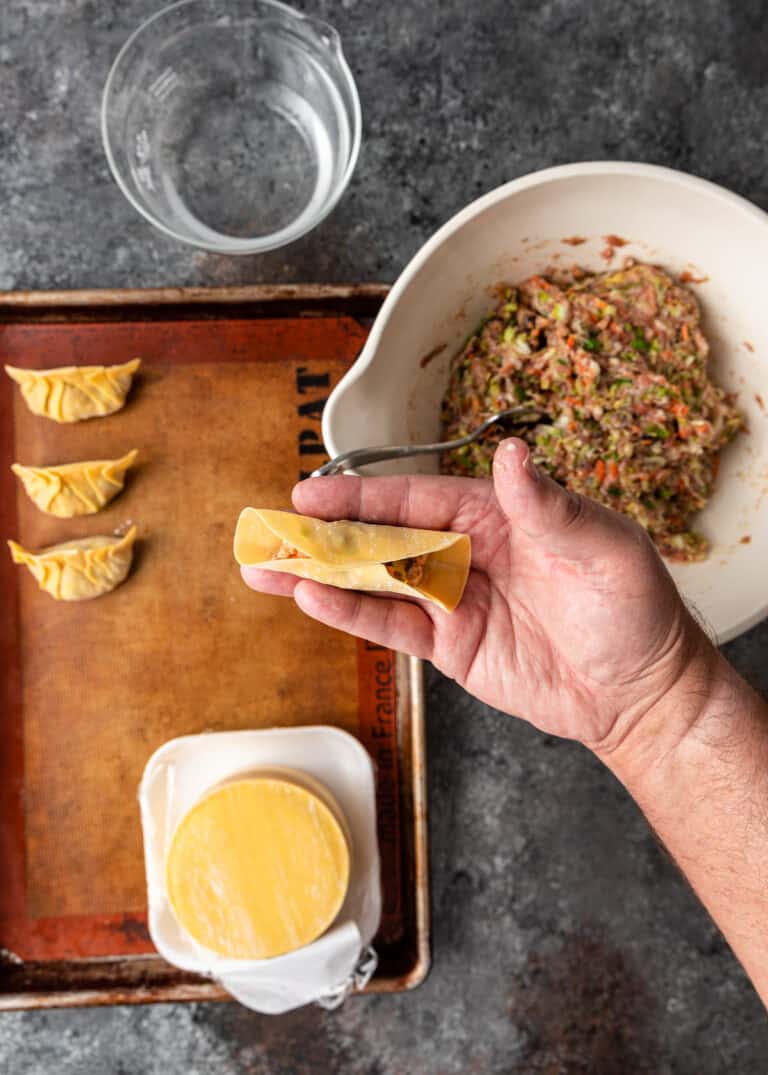
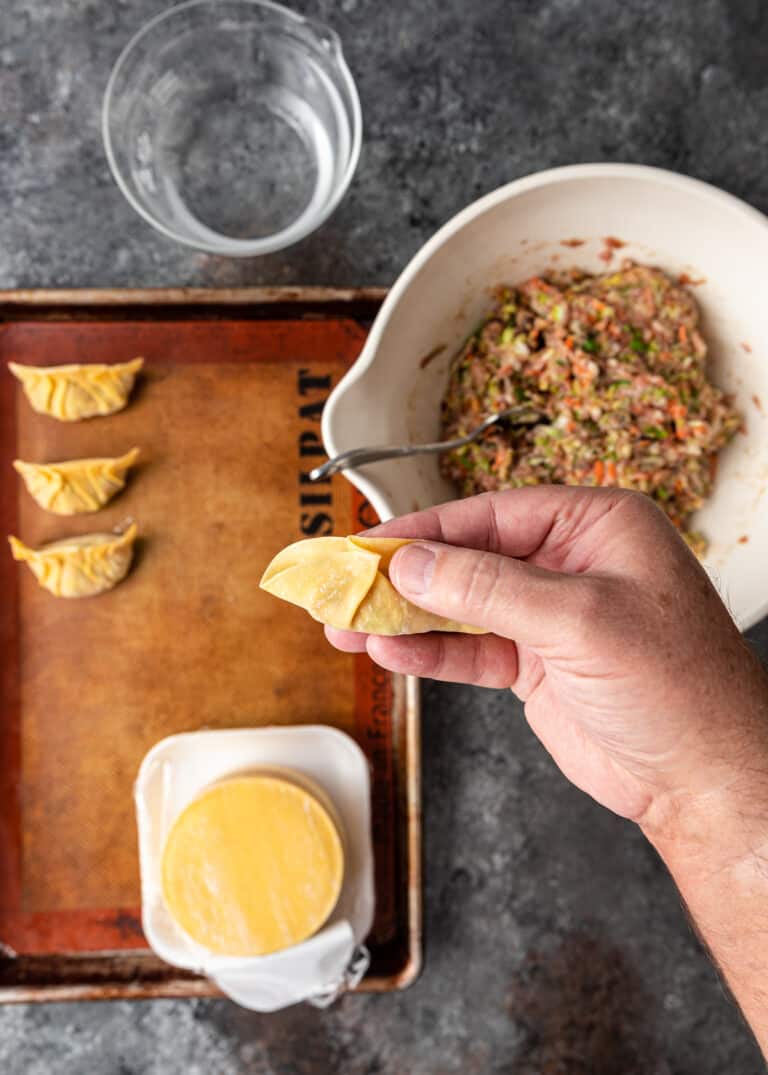
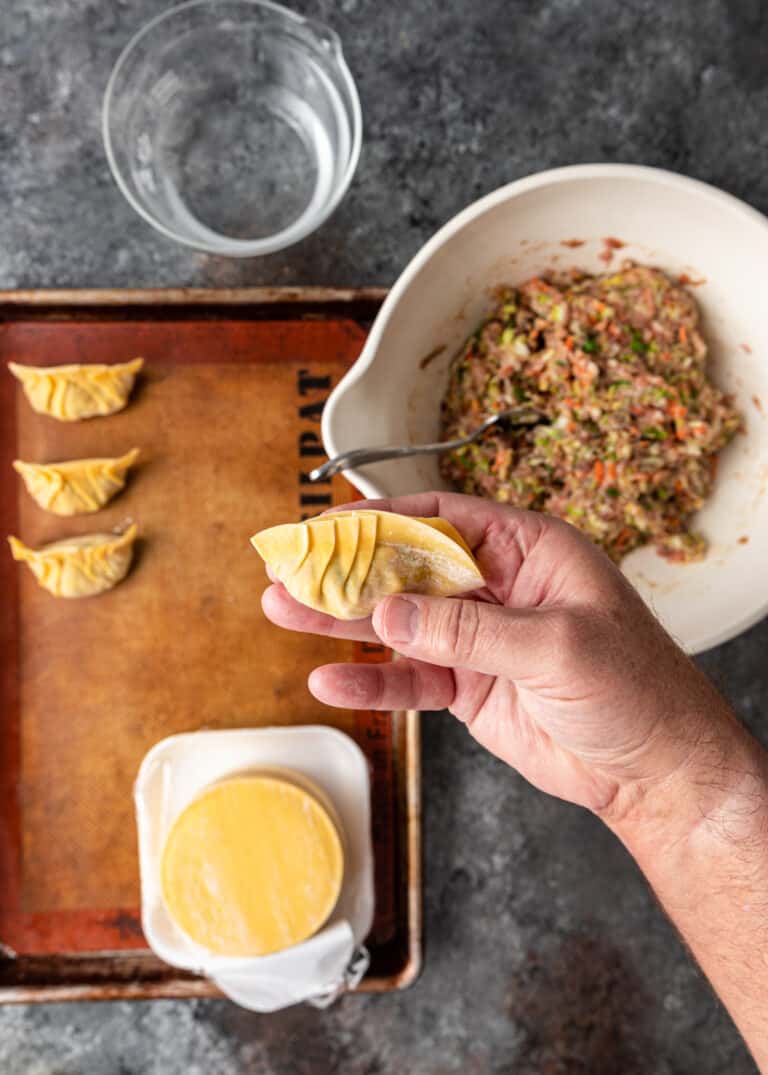
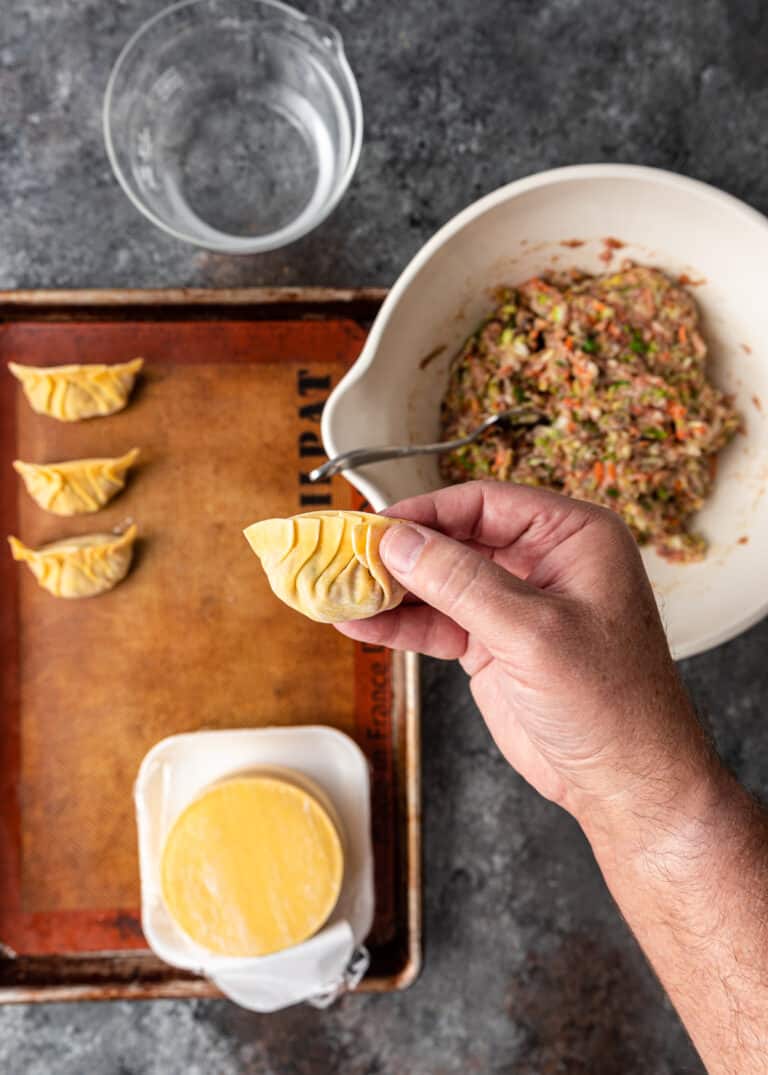
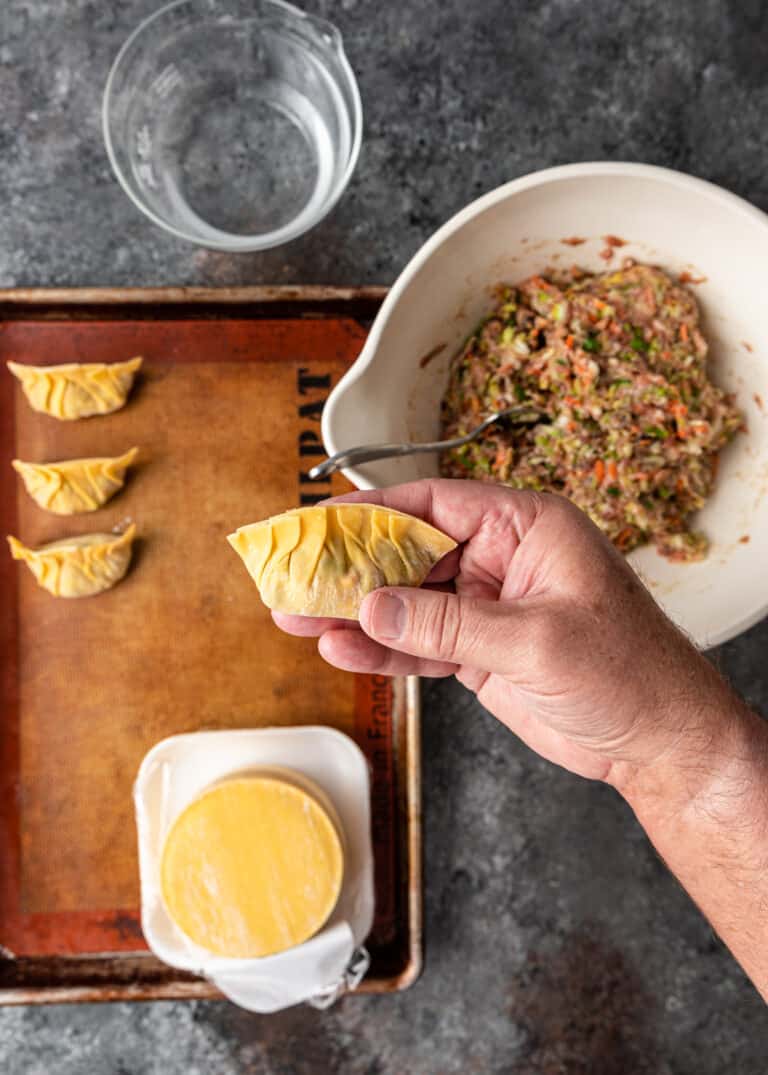
- Fill the Dough Rounds. Wet the outer edge of any store-bought dough rounds, or skip this step if working with fresh wrappers. Add one tablespoon of the pork mixture to the center of each round, then fold the edges up together like a taco. Pinch the center but leave the outside edges open for now.
- Create the Pleats. Focusing on one side at a time, use one hand to pinch the center of the potsticker while you use the other hand to create the pleats. On the left side, you’ll use your left hand to gently pull the dough, pinch to seal, and repeat to create 4 pleats on that side. Then, switch hands and repeat for the other side. The pleats should be moving toward the center of the sticker.
- Transfer & Repeat. Transfer each dumpling to a parchment paper-lined cooking sheet and press down gently to flatten the bottom. Cover the pan with a towel as you repeat the filling and pleating process for the rest of the pork potstickers.
- Fry the Potstickers. Place a large skillet over high heat. Once hot, add the peanut oil, tilting to coat the bottom. Place about 12 potstickers, in a single layer with pleats up, in the pan. Fry for about 2-3 minutes or until the bottoms start turning golden brown.
- Steam the Potstickers. Carefully, but quickly, pour ¼ cup of water into the pan and add a cover. Reduce the heat to medium and cook for about 5-6 minutes. Remove the lid and cook for another minute or so as the water evaporates. Remove from the pan and repeat with the rest.
- Serve. Pair warm potstickers with a selection of dipping sauces like my Ultimate Chili Crisp recipe!
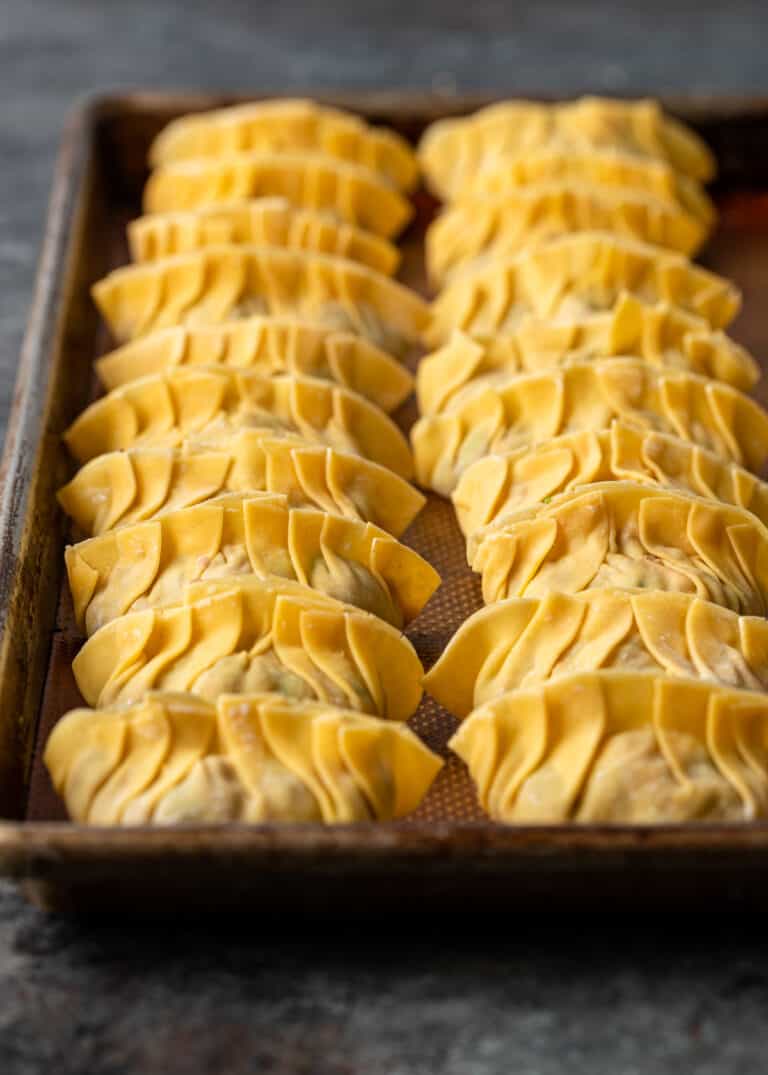
Did You Know?
Potstickers are pan-fried dumplings. They’re steam-fried to keep the filling juicy while allowing the bottom of the dumpling to be crispy and brown.
Wontons are another dumpling, but the dough wrapper is thinner, and wontons are usually served in a broth.
Gyoza are Japan’s version of potstickers. They also have a thinner wrapper and are usually shaped long and thin.
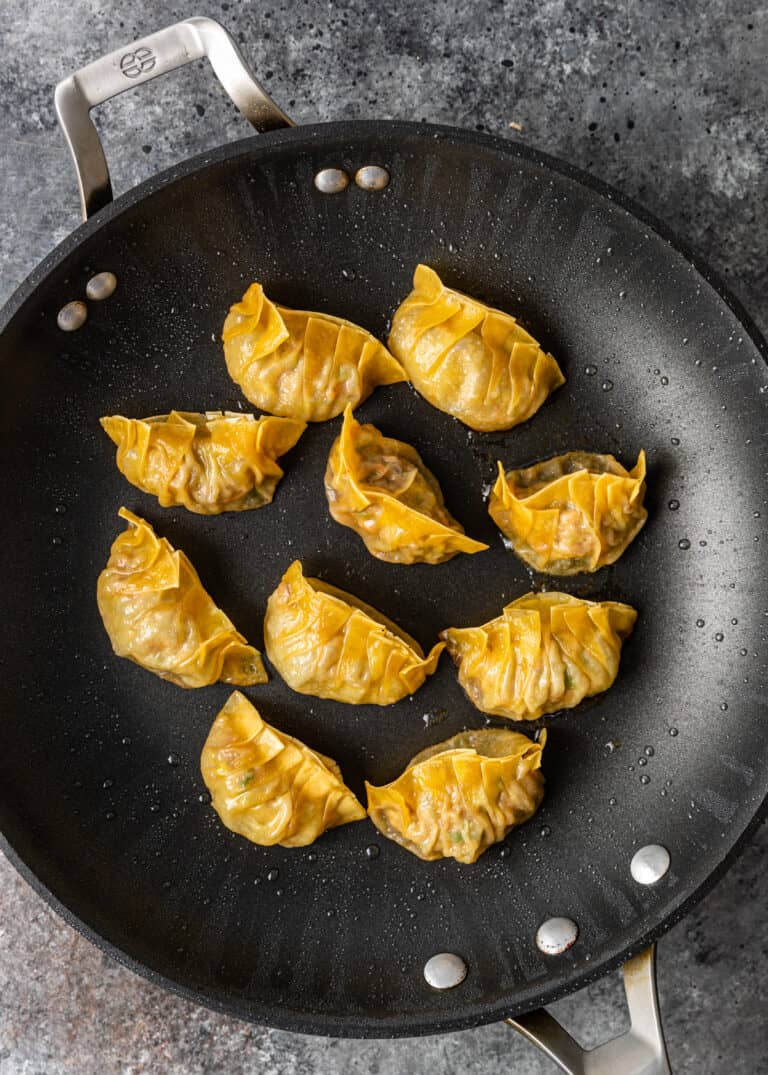
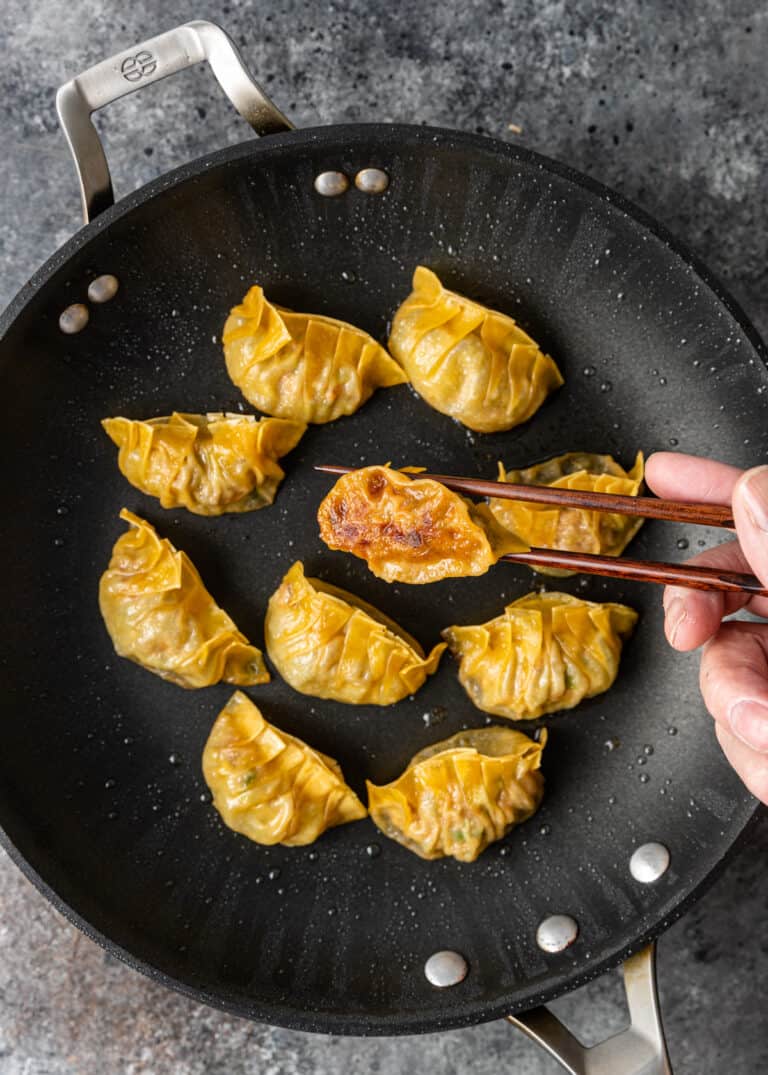
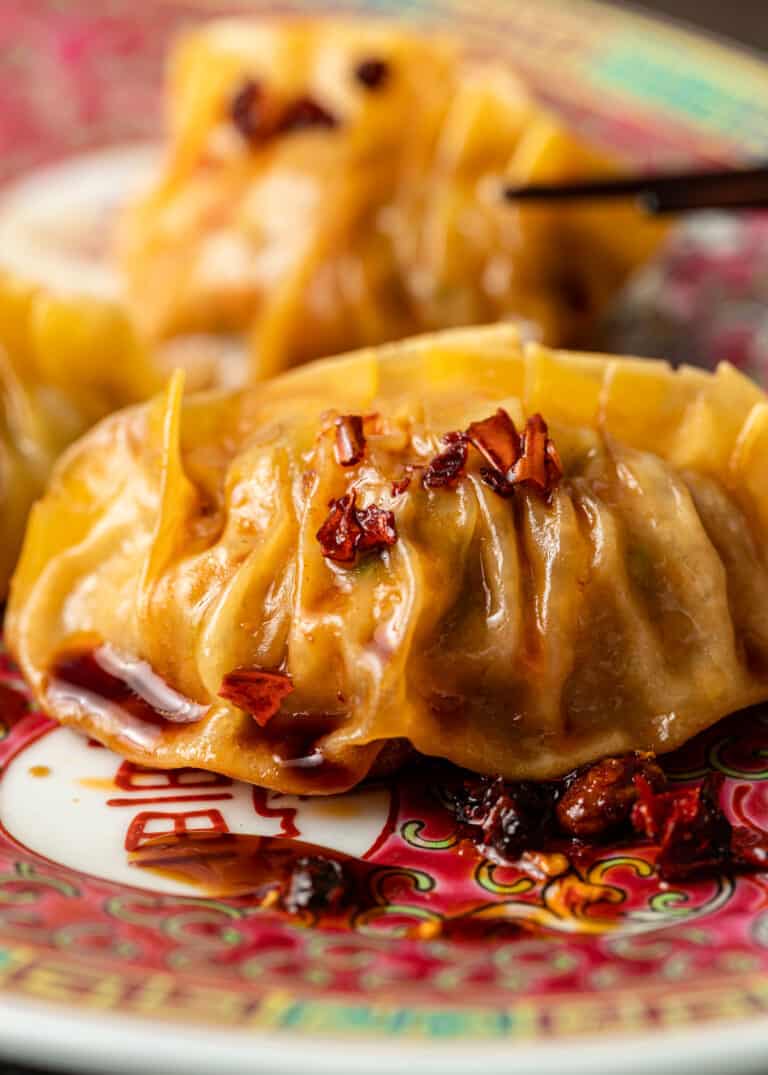
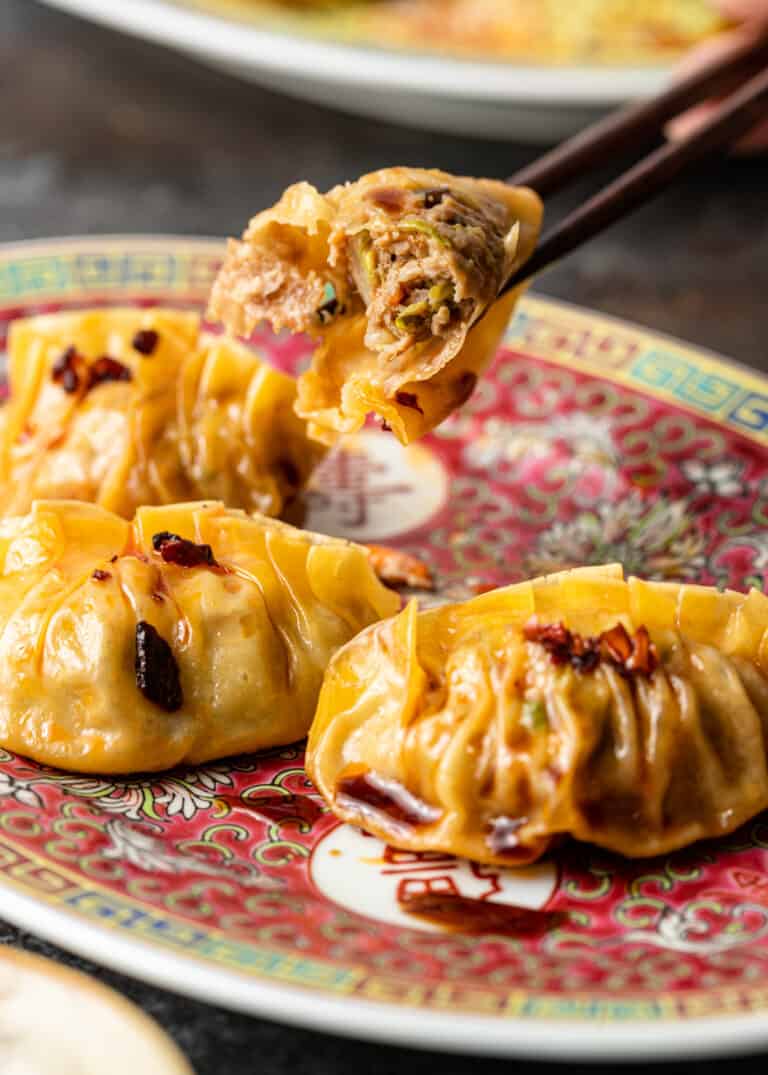
Yes and no. All potstickers are dumplings, but not all dumplings are potstickers.
Pork pot stickers are a type of Chinese dumpling that gets pan-fried before being steamed. Pot stickers are known for their deliciously crispy, golden brown bottoms and thin, delicate wrappers.
On the other hand, the term dumpling encompasses a much larger group of stuffed, doughy delights. Depending on the cuisine, dumplings might be baked, boiled, steamed, or fried and could be filled with a wide variety of fillings.
If your pot stickers are coming out with soggy bottoms, remember that it is likely the moisture in the cabbage.
To prevent this, shred the cabbage in advance, toss it with some salt, and transfer it to a colander. Place the colander in the sink and allow at least 30 minutes to drain as the salt pulls out the excess moisture.
Pork pot stickers make a wonderful snack on their own and fit perfectly into a larger, Asian-themed meal. Here are a few recipe ideas for pairing.:
– Hot and Sour, Egg Drop, or this Sizzling Rice Soup.
– Fresh salads like Sunomono Salad or Chinese Cucumber Salad.
– Asian classics like these Crispy Egg Rolls or Spring Rolls.
– Crab Rangoon, Scallion Pancakes, or any of your favorite Chinese appetizers.
– Chinese Steamed Chicken, Lemon Cilantro Meatballs, or entree of your choice.
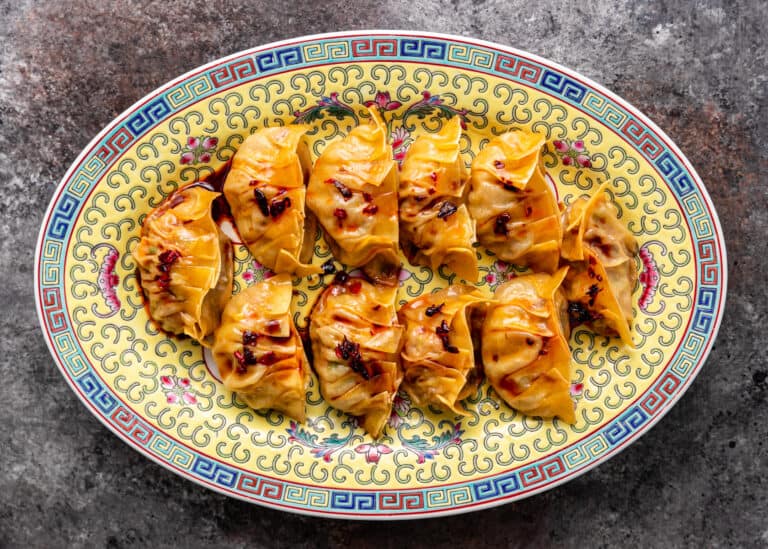
Share this recipe on Pinterest!
Love this recipe? Share it with the world on Pinterest.
This recipe post, originally published on Silk Road Recipes October, 2021, was updated with new content, photos and/or video in October 2023.
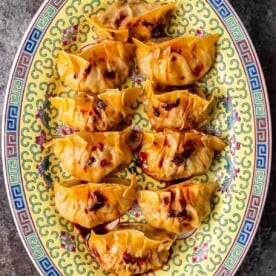
Pork Pot Stickers
Ingredients
- 1 lb ground pork
- 1 tbsp peanut oil
- 6 dried black mushrooms (shiitake)
- 1 tbsp rice wine or dry sherry
- 1 tbsp water
- 2 tbsp soy sauce
- 1 tsp cornstarch
- 1 tsp sesame oil
- 1/2 tsp kosher salt
- 1/8 tsp white pepper
- 2 cups Napa cabbage sliced thin, chopped and salted (See Note 2)
- 1 carrot shredded, finely chopped
- 4 green onions finely chopped
- 2 tbsp ginger paste
- 48 dumpling wrappers fresh or frozen/thawed
Cooking (per batch)
- 1 tbsp peanut oil
- 1/4 cup water
Dipping Sauce (per person)
- 1 tsp soy sauce
- 1 tsp sesame oil
- 1 tsp red wine vinegar
- 1 tsp chili crisp or chili paste
Instructions
- In a small bowl, soak black forest mushrooms in hot water and place something on top to keep submerged for 20 minutes or until soft. Drain, rinse and squeeze out excess water. Remove and discard stems. Chop mushroom caps into thin diagonal strips. turn strips 90° and finely chop.
- Thoroughly combine ground pork in a large bowl with 1 tablespoon of peanut oil. (See Note 1)
- Add rice wine, water, soy sauce, cornstarch, sesame oil, salt and white pepper to ground pork and mix thoroughly. Transfer cabbage, carrot, mushrooms, green onions and ginger to the pork mixture. Mix thoroughly.
- If using store bought potsticker dough rounds, wet the outer edge with water. No need if using fresh wrappers. Place 1 tablespoon of the pork mixture in the center of potsticker dough round. Fold the dough round like a taco and pinch the center together, left and right sides will remain open.
- To create the pleats: Hold the thumb of your right hand on the center top of dough. Using the thumb and index finger of your left hand, push the dough to create a pleat left of center and seal to the right. Move the thumb of your right hand over the new pleat and continue using the thumb and index finger of the left hand to push the dough to create pleats left of center and seal to the right until you reach the end of the left side (about 4 pleats). Now do the same for the right side of potsticker, moving pleats toward center.
- Place the potsticker, pleated edge up, on a lined cookie sheet so they don’t stick. Gently press dumpling to flatten the bottom. Cover with towel and repeat with remaining filling and dough rounds.
- Heat a large skillet until very hot. Add about 2 tablespoons of the peanut oil, tilting skillet to coat bottom. Place about 12 potstickers in single layer with pleats on top and fry for 2 to 3 minutes, until the bottoms are golden brown.
- Next, quickly pour about 1/4 cup of water into the pan. Cover the pan, reduce the heat to medium, and cook for 5 to 6 minutes. Remove lid and let the potstickers cook for another minute, until the water evaporates. Transfer cooked potstickers to a plate and keep warm. Repeat cooking process with remaining potstickers.
- Serve with dipping sauce and chopped cilantro as garnish.
Video
Notes
- Ground pork is typically 90/10, meaning only 10 percent is fat. To keep the pork pot stickers juicy on the inside, I combine the meat with peanut oil.
- Cabbage contains a lot of water, which releases during cooking. The excess water can lead to pot stickers with soggy bottoms. To prevent this, after shredding the cabbage, lightly toss it with some salt and put it into a strainer placed in your kitchen sink. Let the cabbage sit there for at least 30 minutes so that some of the water can drain out.
- NUTRITION: Information shown is for one pork pot sticker with dipping sauce. A typical serving is 3 to 4 dumplings.
Nutrition
The information shown is an estimate provided by an online nutrition calculator. It should not be considered a substitute for a professional nutritionist’s advice.
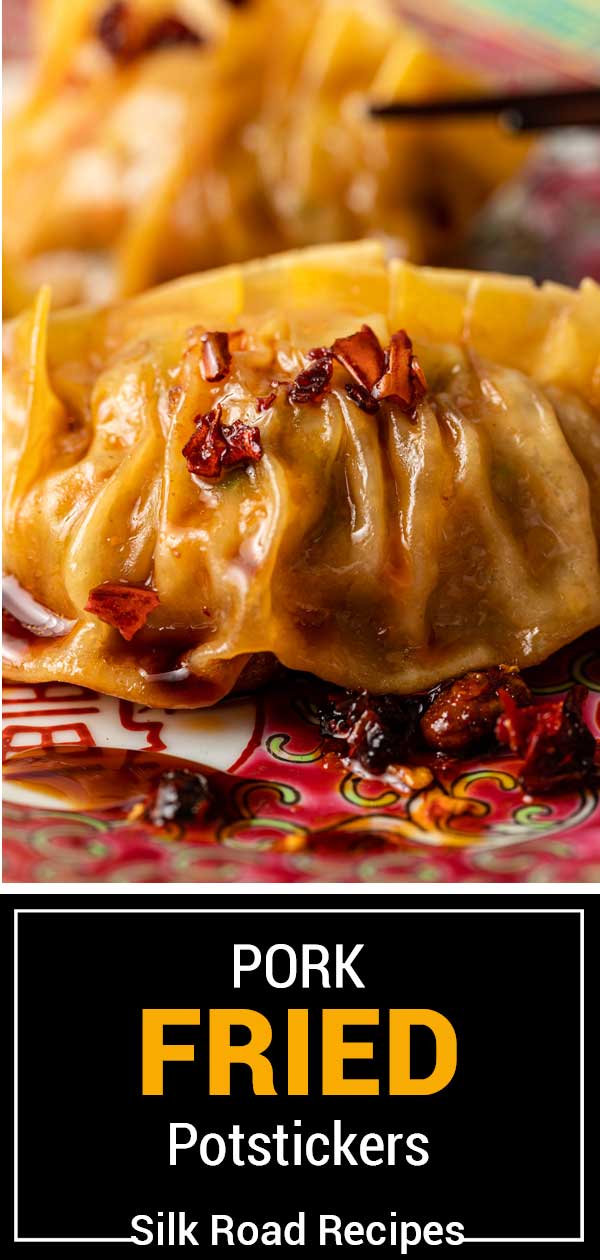

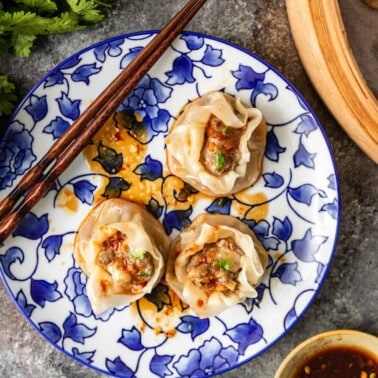
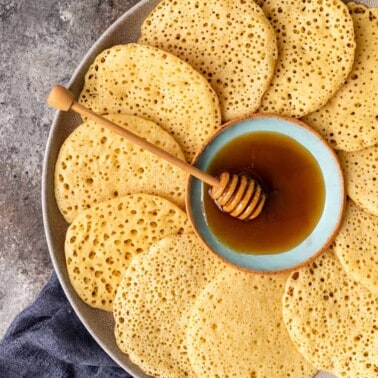
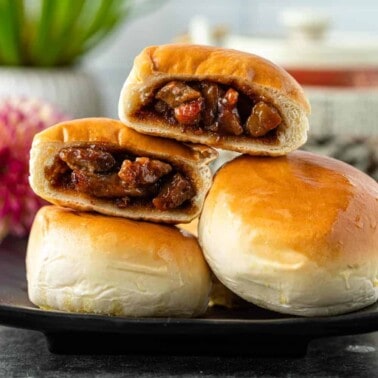
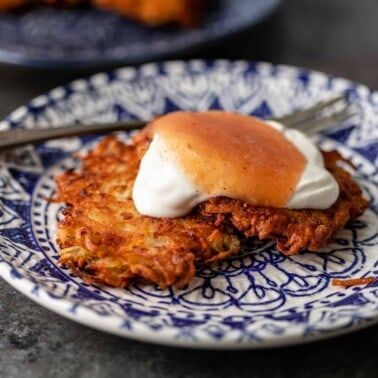








Kevin pretty good stuff I don’t know how you do it but you do it!
Thanks so much James. I love to cook and share this with all of you. 🙂